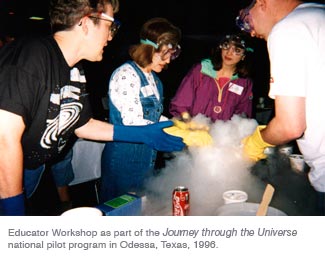3,620 Grade K-13 Educators Trained
 on
inquiry-based, hands-on lessons in the Earth and space sciences,
and aeronautics and astronautics, at 56 professional development
workshops (an average of 64 educators per workshop.) on
inquiry-based, hands-on lessons in the Earth and space sciences,
and aeronautics and astronautics, at 56 professional development
workshops (an average of 64 educators per workshop.)
School Programs by 114 Visiting Researchers
and 9 Visiting Educators from 38 research institutions
nationally:
- 1,554 schools visited across
13 communities (an average each year of 25 schools per community.)
- 4,657 programs conducted
in grade K-20 classrooms.
- 196,700 grade K-13 students participated
in classroom programs (an avg. of 40 students per classroom
program; an annual average of 3,600 students per community.)
- 7 NASA field centers & institutes,
11 colleges & universities, 7 corporations, and the
Smithsonian were among the home institutions of
the Visiting Researchers and Visiting Educators.
95 Family/Public Events conducted
for a combined 34,400 parents, students,
and teachers, corresponding to an average of 360 attendees
per event.
47 Journey through the Universe
Weeks conducted across 13 communities nationally.
Program models developed and assessed
over a wide range of environs, including: under-served
rural communities with both large and small geographic footprints;
inner-city urban areas with high minority populations; a multiple
school district model; school district-led, science center-led,
and university-led initiatives; a single grade level model
across a large school system; and a comprehensive grade preK-20
approach in smaller school districts.
Development of grade K-13 lesson packages
so well mated to curricular standards for teaching and learning
that they can be adopted by a school district as
the curriculum, as was the case for sixth grade in
Washington, DC, in 2000. |
